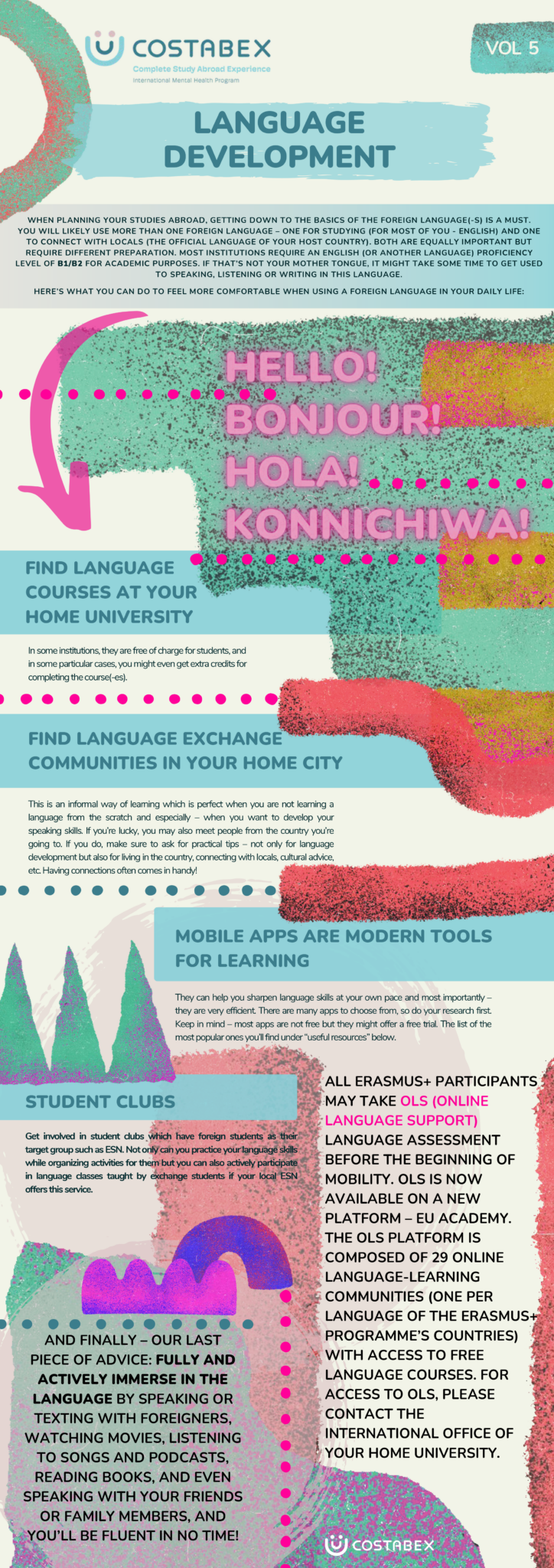A new academic year, new friends and challenges can result in joy, curiosity and other pleasant feelings. But it’s not a secret that new experiences can also cause stress, uncertainty and raise questions.
Cultural adaptation is a process that takes time for a person to integrate into a new culture and feel comfortable within it. Sometimes students expect that after moving to a new country they will immediately make new friends, enjoy everything about the new culture and feel at home. These expectations might come true, but it could also take some time, effort and patience.
Adaptation happens in different stages:
- Honeymoon
- Cultural shock
- Adjustment
- Acceptance/adaptation
- Re-entry shock
It does not necessarily mean that everyone goes through every phase in the exact order. Some people experience a few phases, some experience all of them and some might be going back and forth. Let’s take a look at how these phases are usually experienced by other students.
Honeymoon
When students come to a new country, first impressions are usually quite positive. Students enjoy the new city and feel excited to learn new languages or try new food. They start planning to travel the country and make new friends. At this time students are motivated to learn and experience new things, visit new places.
Cultural shock (disappointment)
While the honeymoon phase makes everyone see things in brighter colours, later the colours might get even darker than they are. This is the time when disappointment and cultural shock hits. During this phase, everything might seem not as kind and fun as expected, and it becomes more difficult to make new friends. You might start missing your food, hometown, friends, family, home, and the differences become annoying. If you start feeling homesick, tired or unhappy, do not hesitate and reach for help – talk with your friends or family, talk with your classmates or ask for psychological counselling.
Adjustment
After the cultural shock phase, people tend to reach the Adjustment phase. This is when you might start accepting the new culture and change the negative attitudes to more open and positive ones. During this phase, students often share that this new country or university is not that different, unpleasant or scary. Students learn to enjoy the new climate, food, places, culture and company of others.
Acceptance and adaptation
When the acceptance phase comes, you might start feeling almost at home. During this phase, students get more involved in university activities, make new friends, travel more and even start making plans to stay in the new country for a longer period.
Another phase that students sometimes experience – Re-entry shock.
This is experienced only by some students who travel back to their home country. During this phase, students often say they don’t want to go home anymore as they have an active social life in the host country.
Moving to a new country is fun and valuable, but it often takes time to adjust. It is very natural and normal to not only feel happy or excited but also sad, lonely or disappointed sometimes.
A quick reminder:
– It’s okay to feel angry – if some cultural norms don’t make sense.
– It’s okay to feel lonely – when all your friends are back in your home country.
– It’s okay to feel disappointed – when you face difficulties.
– It’s okay to feel super happy too!

Don’t ignore your feelings, talk to your friends, family, roommates or seek psychological help at your university. Talking might help not only you but also those around you.
TIPS.
To help you adapt to your host culture:
- Research the culture before you go
- Be open-minded
- Learn some basic phrases in a local language
- Be respectful – what may be acceptable in your home culture may not be in your host culture
- Seek support – talk to your host university, other exchange students or a local mentor for advice
Useful resources:
COSTABEX video and workshop on culture shock: https://costabex.eu/culture-shock/
